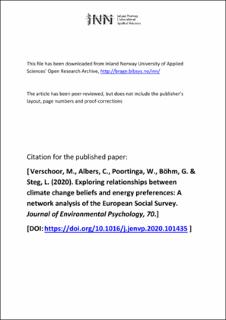| dc.contributor.author | Verschoor, Mark | |
| dc.contributor.author | Albers, Casper | |
| dc.contributor.author | Poortinga, Wouter | |
| dc.contributor.author | Böhm, Gisela | |
| dc.contributor.author | Steg, Linda | |
| dc.date.accessioned | 2023-06-06T08:30:55Z | |
| dc.date.available | 2023-06-06T08:30:55Z | |
| dc.date.created | 2021-01-24T19:30:19Z | |
| dc.date.issued | 2020 | |
| dc.identifier.citation | Journal of Environmental Psychology. 2020, 70 . | en_US |
| dc.identifier.issn | 0272-4944 | |
| dc.identifier.uri | https://hdl.handle.net/11250/3070066 | |
| dc.description | © 2020 Elsevier Ltd. Dette er den aksepterte versjonen av en artikkel publisert i Journal of Environmental Psychology. Du finner den publiserte artikkelen her: https://doi.org/10.1016/j.jenvp.2020.101435. // This is the postprint version of the article published in Journal of Environmental Psychology. You can find the published article here: https://doi.org/10.1016/j.jenvp.2020.101435. | en_US |
| dc.description.abstract | Understanding public attitudes to climate change and energy preferences is key to a successful transformation to a low-carbon society. While many studies have examined relationships between specific variables, little is known about the breadth of relationships between multiple climate and energy-relevant concepts. In this paper we used network models to explore and visualize relationships between climate change beliefs and energy preferences, using data from Round 8 of the European Social Survey (ESS8). ESS8 was conducted in 22 European countries and Israel. We found positive relationships between climate change salience, climate change beliefs, climate change concern, personal norm, and personal outcome expectancy, in line with prominent theories within the area. Moreover, beliefs on efficacy of actions of different actors (i.e., governments, large groups of people) to reduce climate change were positively related, and participants had consistent preferences for fossil energy sources or renewable energy sources, respectively. Furthermore, two types of energy security concerns could be distinguished, reflecting temporary and long term threats to energy security, respectively. Energy supply source preferences, energy policy support, and energy conservation behaviors were mostly not uniquely related to the other module variables. Furthermore, the relationships between variables, reflected in the network structure, were comparable across countries. | en_US |
| dc.language.iso | eng | en_US |
| dc.rights | Attribution-NonCommercial-NoDerivatives 4.0 Internasjonal | * |
| dc.rights.uri | http://creativecommons.org/licenses/by-nc-nd/4.0/deed.no | * |
| dc.subject | energy sources | en_US |
| dc.subject | climate change | en_US |
| dc.subject | policy acceptability | en_US |
| dc.subject | visualization | en_US |
| dc.subject | European social survey | en_US |
| dc.subject | methodology | en_US |
| dc.subject | cross-country comparison | en_US |
| dc.subject | klimaendringer | en_US |
| dc.title | Exploring relationships between climate change beliefs and energy preferences: A network analysis of the European Social Survey | en_US |
| dc.type | Peer reviewed | en_US |
| dc.type | Journal article | en_US |
| dc.description.version | acceptedVersion | en_US |
| dc.subject.nsi | VDP::Samfunnsvitenskap: 200::Psykologi: 260 | en_US |
| dc.source.pagenumber | 49 | en_US |
| dc.source.volume | 70 | en_US |
| dc.source.journal | Journal of Environmental Psychology | en_US |
| dc.identifier.doi | 10.1016/j.jenvp.2020.101435 | |
| dc.identifier.cristin | 1877963 | |
| cristin.ispublished | true | |
| cristin.fulltext | postprint | |
| cristin.qualitycode | 2 | |

